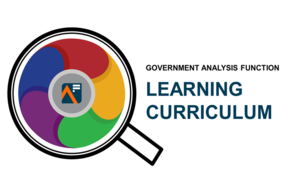Spotlight on the Analysis Function Learning Offer
Why members of the Analysis Function should use the Learning Curriculum

The Government Analysis Function (AF) has around 17,000 members working across the Civil Service. Established in 2018, the AF brings together analysts of all disciplines by facilitating cross-government and cross-profession collaboration on the highest priority analytical issues.
As a function we want to support you in all aspects of your career and development. Our vision is to have the right people in the right place at the right time, with the right skills to deliver better analysis for better delivery.
To do this, we want to provide you with learning and development opportunities to help you meet your potential, ensuring the delivery of a robust, relevant and future-proof analytical learning offer.
Why use the AF Learning Curriculum?
The AF Learning Curriculum is a one-stop-shop for learning, setting out the best and most relevant learning and development opportunities available to you as a government analyst.
The Technical section of the AF Learning Curriculum is the most comprehensive analytical learning offer for all government analysts. It consists of best practices that all government analysts need to know and includes the latest tools, programming languages and RAP (Reproducible Analytical Pipelines) techniques, in addition to:
- Data analysis techniques with all the assumptions, limitations and quality issues that accompany methods and data, including Big Data and Data Science techniques
- Data Visualisation theory and applications
- Methodological topics
- Ways of communicating the analysis and findings to avoid misinterpretation.
Learner experience
Last year, the AF learning team delivered more than 5,000 learning events across government to more than 1,600 learners. Respondents to our surveys said overwhelmingly that they would recommend our learning with more than 90% reporting our learning met their personal objectives.
Sayma Uddin, Office for National Statistics (ONS) commented that “As someone who’s avoided any type of programming before joining the ONS, I decided it would be a huge benefit to try it out and gain some skills. This course made it incredibly easy and accessible and despite no prior knowledge the course went incredibly smooth. My newfound interest of programming and code is a testament to the friendly and supportive trainers and the organised structure of the course.”
Charlie Wills, Head of Statistical Transformation, Home Office Analysis and Insight added, “We’ve been able to use your courses to support the L&D of our analysts while ensuring their learning is consistent with others across government.”
Whilst ‘Introduction to R and Python’ remain the most popular courses, the offer has been expanded to include the Reproducible Analytical Pipeline (RAP) learning pathway, as recommended by the Office for Statistics Regulation in their recently published report about RAP.
Dr Penny Babb, Head of Policy & Standards, Office for Statistics Regulation gave this feedback “I have really appreciated working closely with the team, helping us develop our Code of Practice guidance – it has been invaluable, and I’m very excited about the opportunities for supporting professional development through the Learning Hub.”
What comes next?
To best support you and other government analysts we will:
- Work in partnership with the Government Skills and Curriculum Unit, to develop analytical capability across Government
- Further invest in our Online Skills Tool to help you identify skills gaps, improve learning, and support development and career progression or lateral moves within the Function.
- Future-proofing our learning.
- Develop specialised learning pathways (including current and future topics such as RAP, Data Visualisation, Natural Language Processing and Machine Learning).
- Provide additional learning (for example on Data Linkage, Specialised Data Handling/Cleaning Topics, Bayesian Methods, Hypothesis Testing, Sampling and Weighting and Time-Series).
- Develop more and better ways for learners to feel supported in developing their capability
Why does this matter?
Technology has transformed our lives and the way the government (and hence government analysts) operate. We now have large amounts of data to use to improve our society and economy, and more opportunities to inform our decisions using evidence from data and insights.
At the same time, data being handled badly could harm our society, people, and the economy. We are using data and evidence to inform our decisions, but this comes with a risk as we cannot afford to misinterpret data or miscommunicate its findings in any way. We cannot afford to lose the public trust.
We need to ensure that our work as government analysts is of the highest standards when we collect, clean, and analyse data, as well as when we interpret and communicate results with decision-makers.
- Our work needs to be reproducible, transparent, and quality assured
- Our methodologies need to be the most robust and relevant to the data we are handling
- Our data needs to be the right data to answer the right questions
- Our communication needs to include all the assumptions, limitations and findings, and where these are valid within a true and relevant framework.
To do this, our people need to have the right skills, and the Analysis Function is committed to providing the development opportunities to support all analysts across government.